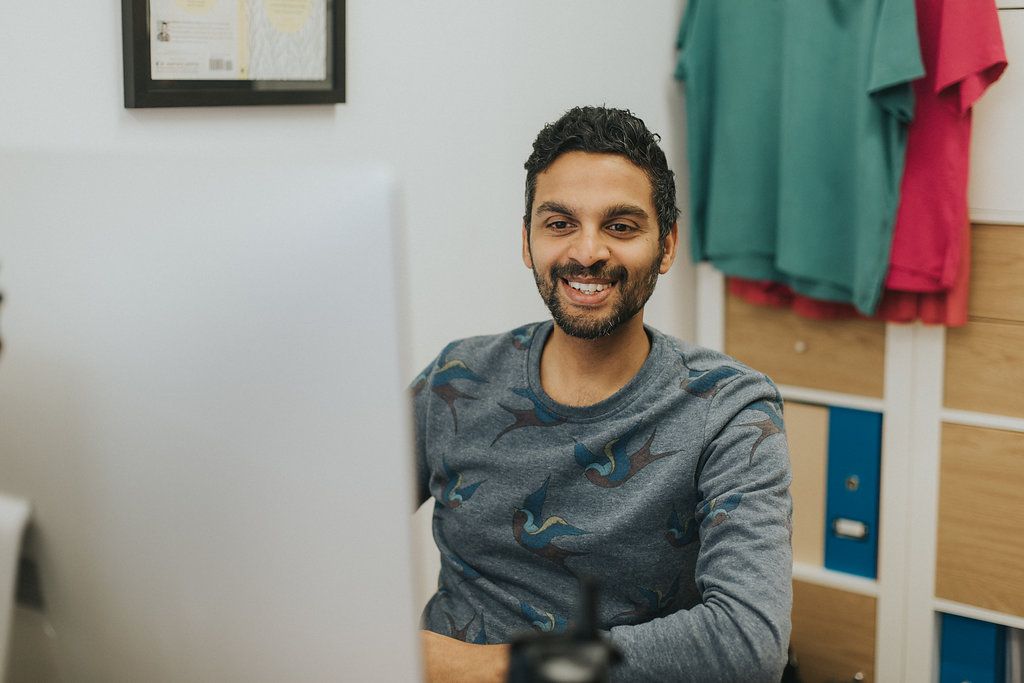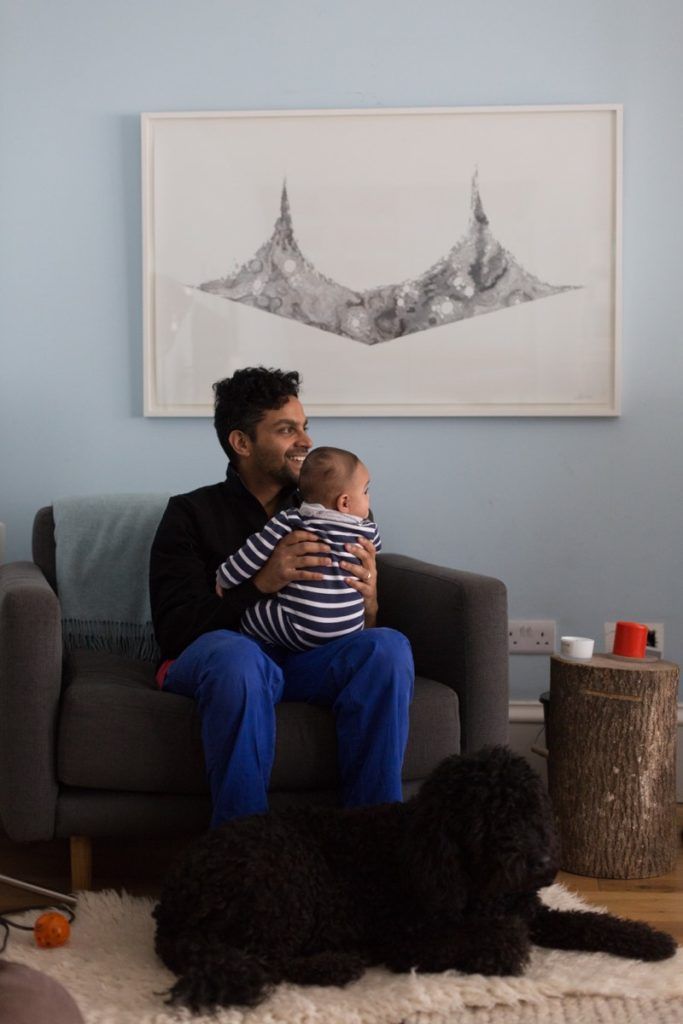Difficult Emotions / Ideas / Team
Rohan talks very openly about the real stresses he feels as a meditation entrepreneur.

As a long-time meditator and the creator of a mindfulness app, people assume that my life is stress-free. If only! And while yes, I do have an above-average level of calm and have naturalised some incredibly valuable skills to deal with difficult emotions when they arise, it would be disingenuous to say that I’ve got it all sorted. The truth is that even though all my work for buddhify is ultimately in service of reducing suffering and increasing well-being in others, it does have a toll on my own.
So in honour of this year’s Mental Health Awareness Week, which is themed around stress, I thought I’d share a candid look at what stresses I feel doing this work. I am of course incredibly fortunate and grateful to be doing this for a living and also for never having any material mental health issues to date in my life. But the idea that just by having my meditation background and being able to share the practice through buddhify somehow means that I have a pristine stress-free life, is a fantasy. I have learnt, over and over again, that stress and difficulty are a core part of what it is to be alive. I’ve also seen the effect that practice has over time to increase your baseline of calm, so that when the difficult does break through, increased balance and wisdom mean that you’re more able to roll with the punches. But the punches do still come. And sometimes they land hard.
It can be nice when mindfulness apps present themselves as perfect, polished, aspirational brands, ever ready with some lovely quote and nugget of wisdom. That however has never really been our style. That’s why over the last year on social media, and in particular our Instagram account, we’ve tried to share a real behind-the-scenes picture of the buddhify team and what it’s really like to do this work. This piece is another instance of wanting to be as real and authentic as possible since those are values that we hold dear.
Ok, enough preamble. Let’s get into this.
There is a common idea that if you make your passion your career, then everything magically lines up, angelic choirs break into song and every moment of your work day becomes a thing of joy. As someone who has turned a passion project which I started as a sideline and evolved it into a small company and my full-time job, I’m sorry to break the news that work is still work. Pushing emails around is still pushing emails around, Skype calls still suck and convincing your broadband provider that yes we’ve tried turning it off and on again but it’s still broken is just as frustrating as it has ever been. Knowing that everything you do does in some way help hundreds of thousands of people all around the world is absolutely a wonderful thing, but in the moment of work chaos, that is far from your mind.
Back in the summer of 2011, I remember meeting Andy Puddicombe for the first time and over coffee we talked about our various plans. Since then, Andy and the wider Headspace team have done a truly brilliant job not only in the success of their own app but also in growing the whole meditation apps from being really quite niche into the now mainstream category that it is. Alongside Alex Tew and the team at Calm, Headspace have done so much for raising the profile of mindfulness in today’s culture and not only do I admire their hard work over the last few years, I also know that their success has been a big factor in our own, given the growth of the market as well as the more direct fact that many Headspace users move onto buddhify. While most observers of the world of mindfulness apps see Headspace, Calm, and us as being quite similar, we are really very different, especially behind-the-scenes. At buddhify, we’ve never taken on any investment, and everything we’ve done to date has been self-funded from app sales. We’re a core team of only four, none of whom work full time. We charge an upfront fee in a space dominated by monthly subscriptions and an app store world where people don’t really pay for apps anymore. We’re very proud of how we’ve made it this far as an independent, family business but the reality is that it is difficult on a daily basis. There are the worries that come with balancing the finances. There is the almost impossible challenge of staying visible when other apps can afford to buy up all the ad space. And as both the business lead, product lead, and content lead — a combination that no other person in mindfulness apps has to deal with — I am always in a state of over-stretch given my involvement in so many different parts of the app. My team does an amazing job but we are so small that there is a limit to what I can let go of myself. For me, this expresses itself as tension in my signature areas of the neck and upper back, feelings of doubt and overwhelm and to be quite honest, every now and then a fair bit of jealousy.
Technology is hard to make, and especially apps. iOS and Android requirements update on a regular basis. There are so many different Android devices available, running such a wide range of Android versions, that it is effectively impossible to make an app work smoothly across them all. For example, right now, buddhify can run across 13,799 different types of Android devices, which is rather a lot! Our developers are absolutely brilliant but it is the inevitable nature of making software that bugs and issues arise, even after testing, because something always comes up when you move from a test environment into real life. It is a little heartening to see that even massive companies such as Apple, Nintendo, and Ubisoft screw up when it comes to releases, but it doesn’t make your own issues any less painful. Out of all the work stresses, there is nothing I feel more strongly than hearing that we’ve got a major tech issue. Typically I feel it in the body as classic fear/anxiety with lurching of the stomach and tension all across the chest. Thankfully however it is relatively rare, but when it hits, it hits big.
There are few better feelings in this game than getting an email from a user or a five star review in which it’s clear that the person writing it understands exactly what we’ve tried to do. One just came in as I’m writing this, went into our feedback Slack channel, and led to a collective whoop across the team. And again you might think that as a mindfulness app, we’d be exempt from the general negativity and occasional vitriol that is the world of online comments, but again you’d be wrong! Whether it’s through email, social media, or reviews, we regularly receive messages that are difficult to read, the writers of which seem to not realise that it will be read by a fellow human who spends all their working day doing what they can to help them. We don’t outsource our customer service and so every single message that is sent to us is read by a core member of our team. We do this on purpose so that not only do we have a great view of how the app is doing, but it also means that users have a direct relationship with us. But it can be hard. And because of negativity bias in our minds, we do tend to focus more on the negative messages than the positive ones, even if there are many more of the latter. When I read those kind of messages, especially the borderline abusive ones, again I feel it as hurt, in my stomach and chest. And I also feel sad because it makes me wonder if the app has helped those people at all if they feel it’s ok to talk to another human like that.
My making buddhify, evolving it into a business, and that then becoming a family business has broken down number of different boundaries. Meditation is a deeply personal thing to me and to call it a passion in itself feels not enough. Over the last 15 years, it’s got to the point where it’s less a thing I do, but rather just a part of what I am. But now that it is also my work, I have to work doubly hard to make sure I’m developing personally when it comes to mindfulness, not just professionally. That can be particularly difficult when it comes to finding time for retreats, which has historically been an important part of how I have deepened. But now that we have a two-year-old child, finding time away is a real challenge. Thankfully I have managed to eke out time for a two-week retreat later this summer, which will be the first one I’ll have gone on in a few years. Another boundary is also family related, in that my wife Lucy and I work together (she’s the female British voice in the app which people tend to love the most). When she first started doing more work on buddhify I found it a real challenge since the app was so much my thing and suddenly her involvement meant my personal life was involved with my work life. There was friction but over time I have managed to get over myself (!) and now working together is a real delight. The flip side of that however is that all our family’s livelihood is tied up in the app and so that puts additional pressure when it comes to making it all work as a business. These stresses present themselves mainly as a sense of restlessness and scattered attention.

So those are the five main stresses I feel as a mindfulness entrepreneur. And over the years I have developed a range of different ways to help me manage them.
Meditation, obviously. The first is of course my own meditation practice. Through both formal and on-the-go practice, I both work on my baseline of calm and stability and also use specific techniques to deal with the various issues that arise. I think a great sign of a mature meditator is that they have a wide range of tools available to them from the meditation toolkit and know which ones work best in different situations. So I’m grateful to all my teachers who have encouraged me to explore diverse techniques and approaches.
I know that’s been a rather long post so if you’ve got to this point, thank you for your indulgence. I’d love to hear from other entrepreneurs working in well-being as to the challenges they feel the most and the strategies they find most useful, so do get in touch.